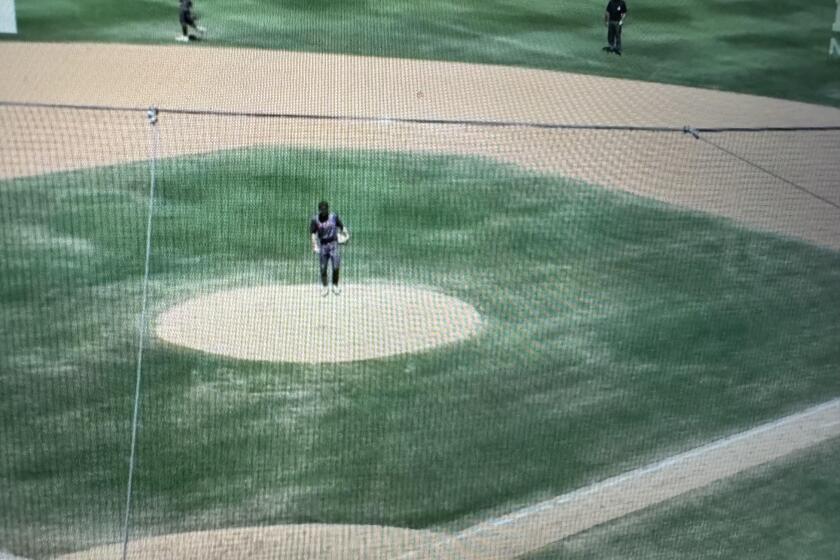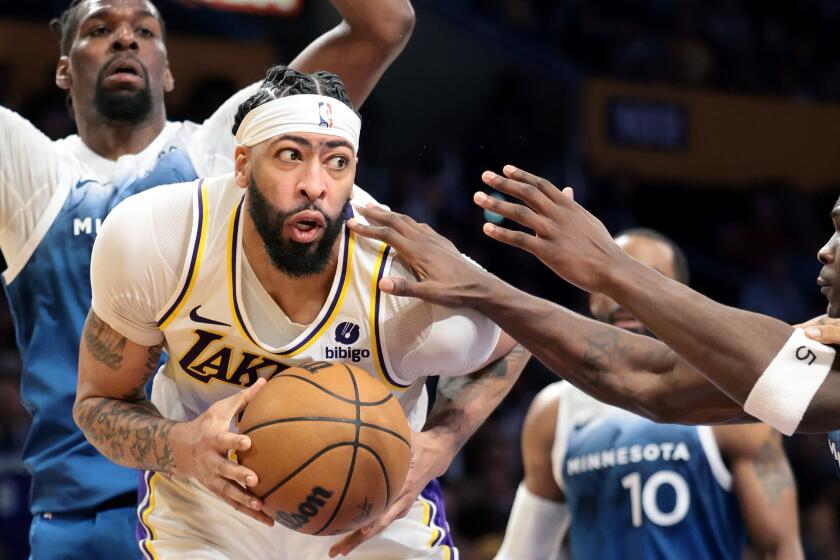Gooden: New Meaning to Numbers : Different Pitcher and Different Person in Mets Uniform
A year ago, he was deep in the minor leagues, at Lynchburg and Tidewater, Va., working his way back to Shea Stadium. Then, he was still trying to digest a month in a drug rehabilitation center that turned his life upside down.
Now, the numbers say he is the old Dwight Gooden. That’s what some of his New York Mets teammates say, too. “It feels like nothing ever happened,” says Keith Hernandez. That 8-1 record, the most wins in the National League, and those three shutouts already, are enough to make you begin believing the fantasy. Come on, Dr. K, pitch a no-hitter. Strike out 20. Win 30 games.
But that’s just infantile bleacher rooting--an image from a past that’s not going to return. And Gooden knows it. At the old age of 23, Gooden is a rather different pitcher, and a far different person, than the K kid who, in Manager Davey Johnson’s words, “was great at 19 and unbelieveable at 20. Doing things nobody had ever done at that age.” Or almost any age.
Gooden has returned with his old smile intact, his silliness and gentleness. But, perhaps, he has the beginnings of a new wisdom, too, although, after all that he’s been through, it’s too early to know where his metamorphosis will end.
“A man can be elated and enriched and ennobled by going through hell,” says Dr. Allan Lans of the Smithers Institute for Drug and Alcohol Rehabilitation, who has been Gooden’s counselor through his ordeal. “Dwight has become strengthened by all of this. It has something of ‘whatever does not destroy me makes me stronger’ about it. This whole thing really does feel like the return of a prodigal son.”
Thursday night, a huge Shea crowd cheered Gooden as he battled the San Francisco Giants’ aged ace, Rick Reuschel, in a scruffy pitchers’ duel with a truckload of men left on base. On the mound, that’s the new Gooden--a competitor more than an overpowering force of youth. Sometimes Gooden says he wants to scream at people not to compare him to the Gooden of 1985 who went 24-4 with a 1.53 earned run average. Then, he catches himself doing it. “I don’t understand how I did what I did in ‘85,” he’s said. “Sometimes I get chills thinking about that season.”
When he struck out 11 Phillies last month, he laughed and said, “You know, I didn’t think I could do this anymore.”
The truth is, he doesn’t do it much anymore. He’s given up 10 hits in a game more often (four times) than he’s fanned 10. In his career, he’d only allowed 10 hits three times before 1988. Gooden’s curveball still stands hitters on their ears. He fanned nine Giants Thursday evening, including Will Clark twice. However, when his curve isn’t knee-high, it’s hittable. And his fastball can consistently be put in play. He’s tough, but mortal. Whoever thought Dr. K would need luck on his side?
He’s had it all spring. Tons of runs--early, late, whenever he needed them. “When Doc was 6-0 he could have been 3-3, and Ron Darling could have been 6-0 instead of 1-3,” says Mets General Manager Frank Cashen.
Two years ago, Gooden might have been torn apart internally by a game like the one he lost Thursday night. Entering the seventh with a 2-1 lead, his tank hit empty--just like a run-of-the-mill pitcher after several jams. Five of the next six Giants got hits and Gooden left in a hail of line drives.
Once, the pressure of astronomical expectations and the desire to justify his large salary might have tormented Gooden. “It would be very difficult for me to relax just thinking about the enormity of what he was expected to do,” says Johnson. “He tried to improve on perfect, or almost perfect, and did some things he didn’t need to do. I’d tell him, ‘You don’t need to do anything.’ You have to understand that kind stress to know what it does to you. I’ve been there and let it get to me. I know it because of what I did.”
Gooden could hardly have a better confidant than Johnson, a former all-star second baseman. “Getting to the top is the easy part,” says Johnson. “Then the pressure arrives to stay there or improve. You know you can’t give any more. And you have to relax just to give what you gave before. But you can’t. Not even when you tell yourself to relax. That’s when it’s got you.”
You might even take your escapes and your releases where you find them.
“Certain personalities can blossom in a media nightmare. It’s like an elixir to Ali, Rose, Reggie Jackson. They even love the controversy,” says Johnson. “But to people who are more private, who have only a few friends and find that sufficient, the microscope and all the attention can be smothering, suffocating. The celebrity status you get here can change you and make you do strange things.”
Last year, lots of Mets did lots of strange things, including Johnson. The team’s response has been to follow Dr. Lans’ advice, even to the point of including him on team flights as a sort of counselor at large.
Lans’ view of Gooden is simple and sympathetic. He agrees with Cashen who says, “We stole Dwight’s youth.”
“A kid finds ways to try on different (styles). How many of us go through a phase as the hipster or the revolutionary,” says Lans. “When you don’t get to do any of that. . . . “
It can feel like jail?
“It damn near got him in jail.”
If the Mets were going to take his youth, they decided to return his joy, if they could. “Dwight’s reached the point where he feels, ‘Whether I ever (go 24-4) again, it’s not important to me. I’m going to enjoy baseball,’ ” says Johnson. “He’s decided to have fun and not set goals.”
There we have it. A big league boss telling his star not to set goals. Gooden’s way of putting is to say that he cares about winning as much as ever, but not about statistics. “Now I’m a person first and a pitcher second.”
If the Mets return to the World Series this year--and they seem quite serious about it (31-13)--it will be a grave blow to the theory of competition living as applied to baseball.
“It’s wonderful to compete and have that drive to excel,” says Johnson. “But when it starts going over into an obsession, when that’s all you do to justify yourself, then you have to ask what you’re doing with your success. Then competition is just a form of greed. There’s a time to let go.”
To a degree, the Mets’ attitude seems to have been reborn along with Gooden’s. If the year of scandal, injury and embarrassment that rent the Mets in 1987 wouldn’t chasten you, what would? “We don’t have the command of ourselves that we should have,” says Johnson, speaking of people generally. “Sometimes you can’t even identify the animal that’s eating you.”
Dwight Gooden’s struggle to find peace with himself, his game and his microscopically examined and colosally celebrated life is a constant process. “Is Dwight ‘happier’ now?” asks Dr. Lans, squirming at such a simple word. “It’s not a steady state. It’s ups and downs.”
Through those ups and downs, Doc Gooden and the good doctor have worked up an image to remember. “You may be in orbit,” says Lans, “but you have to remember the launching pad.”
More to Read
Get our high school sports newsletter
Prep Rally is devoted to the SoCal high school sports experience, bringing you scores, stories and a behind-the-scenes look at what makes prep sports so popular.
You may occasionally receive promotional content from the Los Angeles Times.






